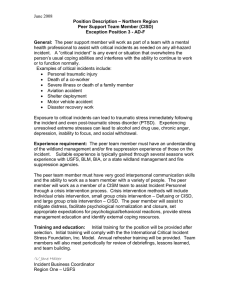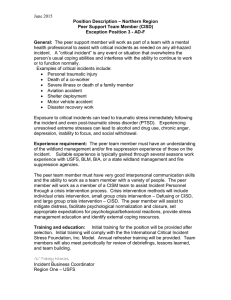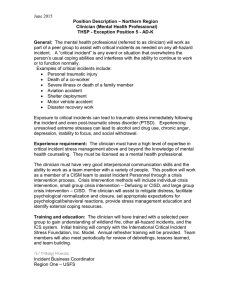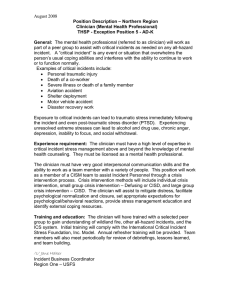Northern Rockies Mobilization Guide 2010 Chapter 60
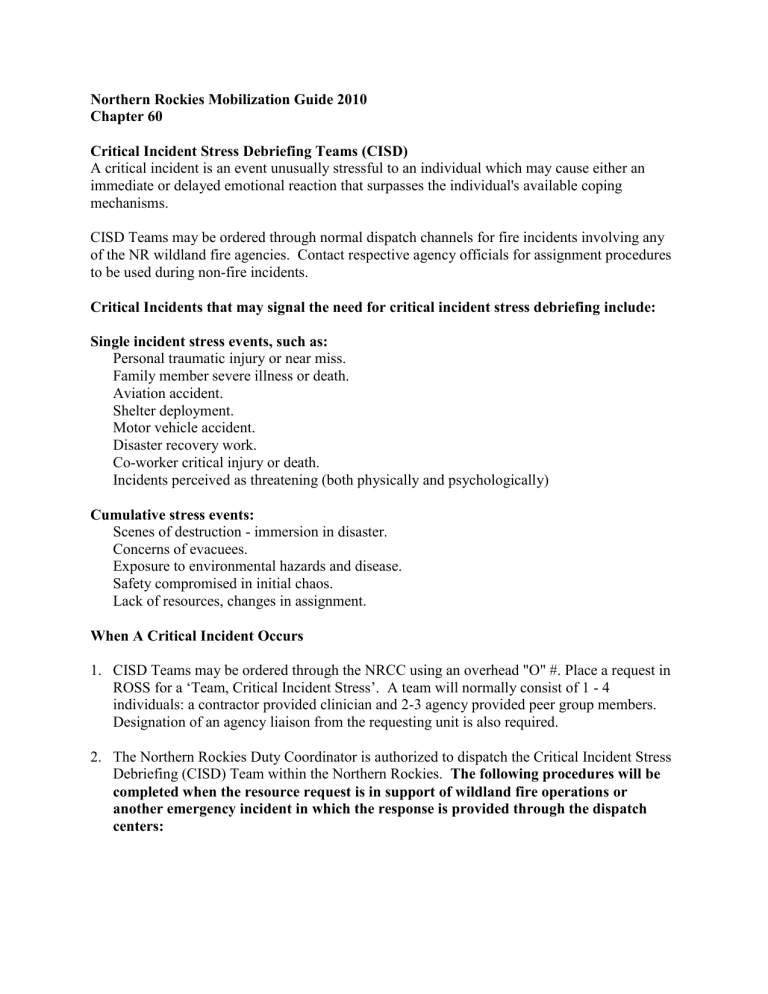
Northern Rockies Mobilization Guide 2010
Chapter 60
Critical Incident Stress Debriefing Teams (CISD)
A critical incident is an event unusually stressful to an individual which may cause either an immediate or delayed emotional reaction that surpasses the individual's available coping mechanisms.
CISD Teams may be ordered through normal dispatch channels for fire incidents involving any of the NR wildland fire agencies. Contact respective agency officials for assignment procedures to be used during non-fire incidents.
Critical Incidents that may signal the need for critical incident stress debriefing include:
Single incident stress events, such as:
Personal traumatic injury or near miss.
Family member severe illness or death.
Aviation accident.
Shelter deployment.
Motor vehicle accident.
Disaster recovery work.
Co-worker critical injury or death.
Incidents perceived as threatening (both physically and psychologically)
Cumulative stress events:
Scenes of destruction - immersion in disaster.
Concerns of evacuees.
Exposure to environmental hazards and disease.
Safety compromised in initial chaos.
Lack of resources, changes in assignment.
When A Critical Incident Occurs
1.
CISD Teams may be ordered through the NRCC using an overhead "O" #. Place a request in
ROSS for a „Team, Critical Incident Stress‟. A team will normally consist of 1 - 4 individuals: a contractor provided clinician and 2-3 agency provided peer group members.
Designation of an agency liaison from the requesting unit is also required.
2.
The Northern Rockies Duty Coordinator is authorized to dispatch the Critical Incident Stress
Debriefing (CISD) Team within the Northern Rockies. The following procedures will be completed when the resource request is in support of wildland fire operations or another emergency incident in which the response is provided through the dispatch centers:
The Northern Rockies Duty Coordinator will contact Jan Everett or Mary Jo Lommen who will confirm the name and phone number of the Peer Group Coordinator. This information will be added to the documentation section of the resource order for the
CISD Team.
Peer Group Coordinator Office
Jan Everett
Home Cell
406-329-4938 406-543-2832 406-544-1665
Mary Jo Lommen 406-329-4930 406-822-4947 406-544-4058
The Peer Group Coordinator will provide the NRCC with peer group member names for this assignment.
The Northern Rockies Duty Coordinator will then contact the Employee Assistance
Program (EAP) representative to request the assignment of a CISD clinician. The person making the contact must identify themselves as the Northern Rockies Duty Coordinator and supply the incident name and order number. Provide the name of the Peer Group
Coordinator and request direct contact by the clinician to the Peer Group Coordinator.
EAP Contact
Norman Winegar
Liz Bonet
After Hours Contact
Contact Number
866-569-2370 (day)
866-699-9165 (day)
800-522-1073
The NRCC Duty Coordinator or OH desk dispatcher will fill the ROSS order for the
CISD Team with the clinician and peer group members as rostered subordinate requests.
The NRCC will fill the request for the clinician with the “fill by agreement” feature of
ROSS. Individual subordinate requests for peer group members will be placed to the individual‟s current dispatch center. An electronic copy of the filled CISD Team resource order in a recommended PDF file format will be emailed to the EAP
Contracting Officer, Dale Reckley, at dreckley@fs.fed.us with a subject line of: CISD
EAP Consultant Contract.
Once the initial order for a CISD Team is received, work with the ordering dispatch to complete the CISD Team Request Form found in Chapter 20, Forms. This form will be provided to the Clinician or Peer Group Coordinator as initial information regarding this incident.
If a request is received for a CISD in support of a USFS non-wildfire event, one of the following individuals must be contacted to order the clinician from the EAP representative :
Ordering Official Office Home Cell
Margie Irvine
Kathy Engstrom
406-329-3170 406-251-4641 406-370-7917
406-329-3449 None 406-531-8640
For non-wildfire events for other agencies, contact your respective agency officials for agency protocol.
Other items to consider when mobilizing a Critical Incident Stress Debriefing Team:
Work with the ordering dispatch center to request the CISD Team as soon as the need is recognized. In most cases it is desirable to debrief the affected crew within 24 to 72 hours after the incident. Specific arrangements regarding timing of the debriefing will be discussed with
CISD Team for their input and advice.
Assess who may need debriefing (i.e. fire responders, fellow workers, others attached to the critical incident, Incident Management Team). You may wish to discuss additional debriefing needs with the CISD Team when they arrive.
When a critical incident occurs, there is often an impact on the Incident Management Team
Command Staff. They may also need to be debriefed by the CISD Team. The HRSP will act as the liaison for the IC in requesting CISD resources and coordinating all CISD needs for the incident.
Keep crew and others informed of the status of the injured. If there is no information, tell them that.
The CISD Team should, whenever possible, precede the Investigation Team.
The CISD Team should be consulted prior to returning the crew involved in the critical incident to work or releasing them to their home units.
Follow-up debriefing(s) may be required once crews or individuals return to home units.
